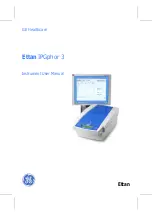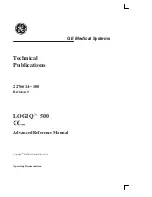
20.2. Connecting Calibration Gas
Connect cylinders of calibration gas to the inlet ports labeled “Gases” on the left side of
the AutoRAE 2 Controller. Make sure that they are connected to the correct inlet, as
defined in Gas Bottle settings described in Section 21.1.
All gas connections are barbed to secure the hoses to them. Appropriately non-
reactive/non-adsorptive tubing with a 1/8" I.D. should be used (Teflon for PID or
corrosive or reactive gases, Tygon for others). The cylinders must have demand-flow
regulators (0 to 1,000 psig/70 bar) installed.
IMPORTANT!
Always check that the Gas Bottle configuration for each inlet on the AutoRAE 2
Controller matches the type/concentration of the actual calibration gas connected to it
before you begin any bump test or calibration. Also, make sure the calibration gas is not
past its due date.
Note:
When a cylinder of gas is empty, or has low pressure, it should be replaced.
Cross-Sensitivities Determine The Order In Which Sensors Should Be
Calibrated
Gases used for calibration should be configured and connected to inlet 1, inlet 2, inlet 3,
etc., in the order in which the sensors should be calibrated. This applies to both a
standalone cradle and controller-based systems. Refer to page 20 for more details.
Information on the order of calibration is available in RAE Systems Technical Note TN-
114.
Exhaust
Calibration gas cylinders
(each has a demand-flow regulator)
AutoRAE 2
Controller
AutoRAE 2 Cradles
(maximum of 10)
Summary of Contents for AutoRAE 2
Page 1: ......
Page 38: ...Select Exit to return the monitor to Normal Measurement Mode...
Page 43: ...When you click on Gas Config 8 the two gas bottles Gas Inlet 15 and Gas Inlet 16 are shown...
Page 76: ......
Page 95: ...Set the password for access to the AutoRAE 2 Note The default value is 0000...
Page 121: ......
















































